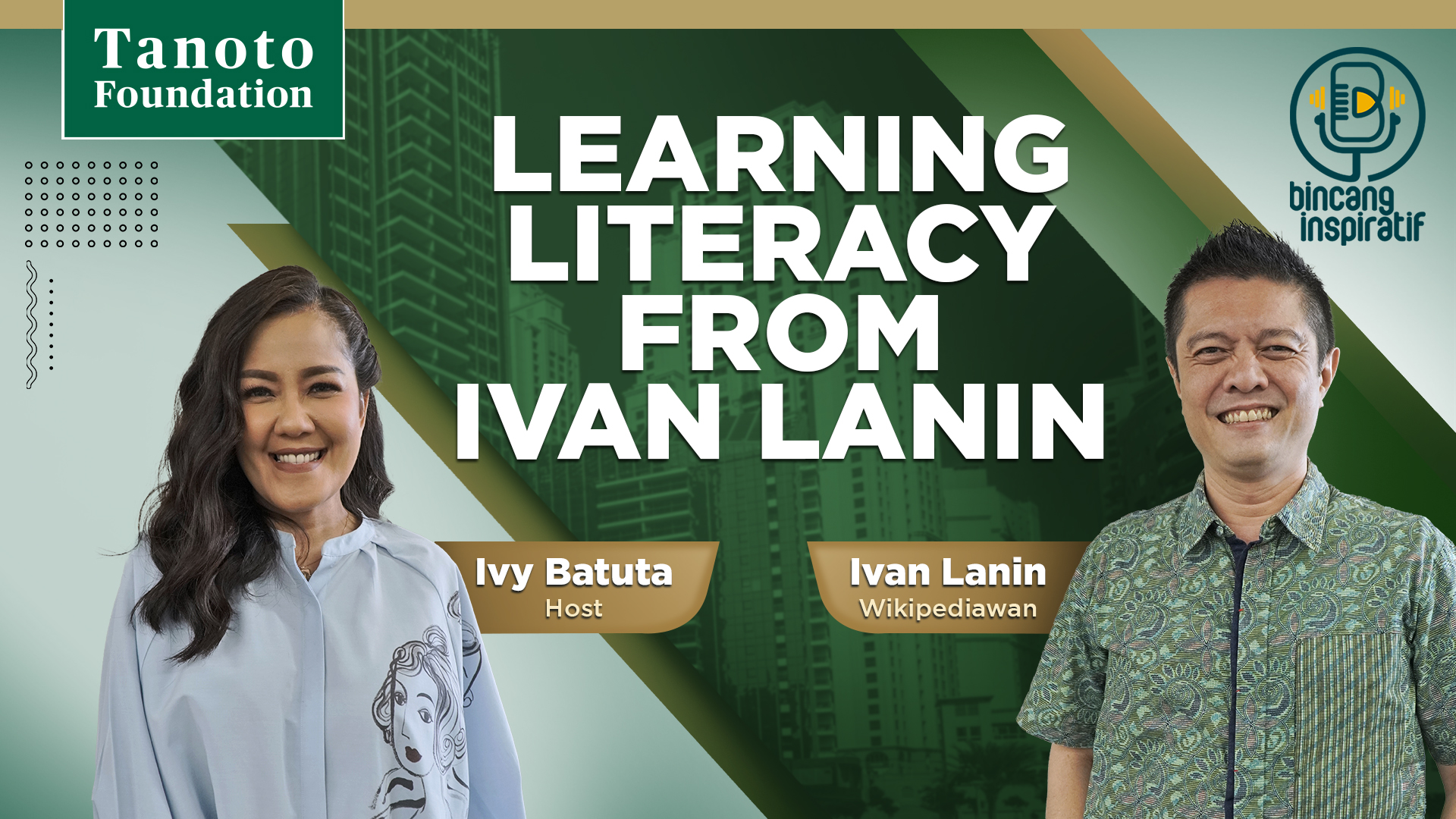Learning Literacy from Ivan Lanin

According to the 2021 Education, Culture, Research, and Technology Ministry Report, Indonesia faces a literacy emergency. The Indonesian Language Development Institute also concluded that Indonesia faces a literacy crisis. Indonesia’s literacy level is at a low level.
Literacy is not just about reading and writing. In the past, literacy only covered the ability to read and write. Literacy is evolving with its meaning and interpretation changing. We in Indonesia are familiar with ‘Calistung’ (reading, writing, computing and counting).
But along with the digital technology development, literacy expanded to nine types: reading, writing, computing, numeric, science, digital, finance, culture, and citizenry.
“Literacy is no longer just about the ability to read but also to absorb information, comprehend the truth of information, and produce new information with digital technology,” said Ivan Lanin in the latest Tanoto Foundation’s Inspiring Talk, which Ivy Batuta hosted.
Ivan Razela Lanin is an Internet expert and He is an activist who campaigns to use a standard Indonesian language. He graduated from Information Technology at the University of Indonesia and obtained his master’s degree in IT from the Institute of Technology of Bandung.
He then worked as an IT programmer for ten years and became a management consultant before becoming an Indonesian language teacher.
“I found out that nearly all letters and reports have language mistakes,” said the IT expert, who then became a teacher because he wanted to improve such a situation.
Among the Lowest in the World
Ivan cited the United Nations Educational, Scientific and Cultural Organization (UNESCO) 2013 report in the talk show. It concluded that only 1 in 1,000 Indonesian people has good book-reading habits. Or it just 0.001 percent.
“It (the inferior literacy level) is caused by several factors, such as the lack of familiarization with reading habits from an early age in families. It has a stumbling impact on accessing new information,” said Ivan.
Indonesia’s literacy continues to decline. According to research, the human attention- span now is just about 40 seconds due to the massive use of gadgets and social media, compared to the 3.5 minutes 10 years ago.
“It means that humans can only concentrate for 40 seconds now. Ten years ago, humans could still focus much longer, by nearly ten times,” Ivan explained.
“We are spoiled by technology. When we want to know something, we go to Google or ChatGPT to find out. Without having access to books, they already feel smart. They no longer need to look for references on whether the information is right or wrong,” he explained further.
Indonesian Professionals Are Uncompetitive
The World Economic Forum (WEF) published the Future Jobs Report 2023 in April this year. It explores how jobs and skills will evolve over the next five years. The report also predicted the professions and skills needed in the next five years.
“There are four Cs for the 21st century. It is the abbreviation of skills essential human resources should master in this digital era. The four skills are Critical thinking and problem solving; Creativity; Communications skills; and Collaboration,” said Ivan.
Citing his own experience, he found that Indonesian consultants often fail to match upto the foreign consultants. This comes as a surprise one would assume Indonesians beingeffectively bilingual should hold more advantageous over foreigners.
“Indonesians are not less smart than them. But Indonesians are often not self-confident when presenting something verbally or in writing,” the energetic promoter of the use of standard Indonesian language.
The proposal recipients should find it easier to read the proposal written in Indonesian. But the language is less focused,while English proposalsare more straightforward and clear.
Efforts to Optimize Literacy
Amid the progress of technology, which facilitates information access, we must be wise in judging or comprehending the information we receive. Technology enables misinformation to spread widely and speedily.
“There are different sources of information, they come from reading, observations, and conversations.”
Apart from this, parents and teachers must begin to read to their children to improve literacy quality at a family level. From there, children will understand that by reading diligently will allow them to get information they have never experienced before.
“We can turn around the low literacy in Indonesia. With motivatededucators, we can work together to develop literacy in Indonesia,” Ivan argued.
Improving Interest in Reading
Indonesians lack theinterest in reading and writing
The knowledge level of our nation will not increase because human knowledge continues developing, and science continues developing. Now, there are Big Data and Artificial Intelligence. The concept of science and knowledge continues growing and Indonesians need to catch up with the developments.
“When we are too lazy to read, our access to new science and knowledge islow. As a result, we believe in whatever information we receive without verification,” said the literacy activist.
Parents and teachers need to encourage young Indonesians to read books. The need to be the children’s role model and inspiration in the pursuit of knowledge and literacy.

Leave a Reply